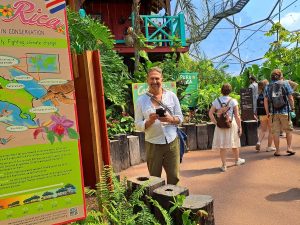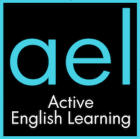Do you remember Mr Harry Wormwood? And Miss Agatha Trunchbull?
Mr Harry Wormwood is a car salesman, Matilda’s father, in the story of “Matilda” by Roald Dahl.
One evening Mr Wormwood abruptly takes the book out of Matilda’s hands and forces her to watch TV with the rest of the family in order to be a real Wormwood… (read more about him)
 Miss Agatha Trunchbull is the head-teacher of the school Matilda attends. Miss Trunchbull is a former athlete, expert in hammer throw and shows such an extreme personality that you laugh at her methods to impose order and discipline… (see how Miss Trunchbull leads education in her school in this videoclip)
Miss Agatha Trunchbull is the head-teacher of the school Matilda attends. Miss Trunchbull is a former athlete, expert in hammer throw and shows such an extreme personality that you laugh at her methods to impose order and discipline… (see how Miss Trunchbull leads education in her school in this videoclip)
Those two peculiar characters came back to my mind in these days when the schools are reopening (or have already started) in most places of the northern hemisphere.
They are satiric examples that obviously never happen in real life. They just come out of the imagination of an Author, don’t they?
Questions to some students
A few months ago, I asked some students in different schools whether there are any cases recalling such imaginary educators.
 For instance, has a teacher ever said to a you: you can’t do maths, you are too stupid… Or: this homework is too well done, it can’t be yours…
For instance, has a teacher ever said to a you: you can’t do maths, you are too stupid… Or: this homework is too well done, it can’t be yours…
Well, roughly 3 out of 10 said that those cases are real, though not at the parodic degree of Mr Wormwood and Miss Trunchbull…
Amid many valuable teachers and wonderful parents, there still is a significant portion of children, subject to offences and insulting comments. In the old past times adults disguised those “educational actions” under the purpose “to make you stronger”, “this is for your good”, “whether right or not, you do as you are told”… sigh
A dry compulsory syllabus and the “hosepipe” teachers
The issues of adults being verbally abusive, being careless or unsupportive of children interests should not be underestimated, labelling them as residual behaviours of retrograde old teachers or parents. We are all at risk of incurring into those black holes of a daily routine.
 When something happens, schools might panic and be tempted to cover up rather than tackle those issues in a mutually supportive cooperation.
When something happens, schools might panic and be tempted to cover up rather than tackle those issues in a mutually supportive cooperation.
The main problem however is even deeper: the main problem is that schools are still based on the anachronistic concept that a certain amount of cognitive baggage has to fill our pupils, even if most of that cognitive baggage will be out-of-date in less than five years…
The role of teachers in such a context is quite similar to the hosepipes: they have to pour a meaningless stream of their dry ‘knowledge’ into containers rather than inspiring and caring for the qualities of their pupils.
A research about curiosity
A research carried out in California about 8 years ago found that curiosity may stimulate eagerness of learning!
Furthermore, the research revealed that people who are curious to discover something on a certain topic will retain the outcome of a parallel learning process for longer time if exposed to it before the primary curiosity was satisfied!
If those findings could jump out of the lab and join the real life, they might inspire teachers and parents to update their educational behaviours.
Walk nowadays into any common school: you will see kids carrying heavy bags from class 1 upwards! What kind of culture are they carrying? The more you climb the classes, the more children seem to be apathetic, bored, ‘lazy’, not interested.
Is it because they are born without curiosity? Or do they need some special new lessons to inoculate curiosity into them?
How to nourish curiosity?
Have you ever try to imagine what children would say if we ask them about nourishing their curiousity?
Please leave me alone. My curiosity will flourish safely if you get rid of me. Just don’t speak about or you might kill it…
 In fact the risk of killing curiosity -and with it the innate passion for learning and discovering- is quite high in our time. And it is very tricky because on paper and on chats it’s not easy to distinguish what is boosting and what is destroying it.
In fact the risk of killing curiosity -and with it the innate passion for learning and discovering- is quite high in our time. And it is very tricky because on paper and on chats it’s not easy to distinguish what is boosting and what is destroying it.
Let’s take the sample of children given a tablet or a smart phone in early years. Parents and even teachers in schools might believe that those devices are boosting imagination, curiosity, creativity. Is this the case? A rhetoric question for me, but what about you and your school?
Are tablets and smartphone stimulating or killing curiosity?
Some people want to prohibit mobile devices at school. And to some respect it would make sense to shut down interferences during the lessons.
Prohibition however is never a way forward.
Awareness is.
 I am not against technology here. I became a software engineer in the ‘70s as I was (and still am) really fascinated with the world of software. Not hardware, but software or how human logical thinking can instruct and direct machines.
I am not against technology here. I became a software engineer in the ‘70s as I was (and still am) really fascinated with the world of software. Not hardware, but software or how human logical thinking can instruct and direct machines.
Technology itself is not a bad thing. On the contrary. However, I do consider a large, unfiltered use of technology in education a terrible trend. Not a human trend.
Interested to read more? Visit my previous article “A tablet for my baby? No, thanks”
Children are full of dreams and talents. Education is to help them develop dreams into visions, talents into vocational passions and commitments. Nowadays, adults are instead caught by illusions rather than visions.
The AEL summer school at Sands
This summer we worked on “building a community of learners” in consideration that the past two years with Covid saw large disruptions in learning and in social interactions.  We wanted to contribute to the healing of those vulnerabilities and refresh our students self-confidence as well as their joy of being and learning together.
We wanted to contribute to the healing of those vulnerabilities and refresh our students self-confidence as well as their joy of being and learning together.
We were lucky to have at the centre of this effort a teacher like Sean who offered himself -literally: offered himself- to the summer students. Not just in terms of skills, knowledge, time and energy.
He offered his dedication, that is the core of education and a vital lymph of human relations.
The wonder of our wonderful world
The enthusiasm and the presence of a teacher is what makes the difference in education.
Human beings feeding and inspiring other human beings is the wonder of our wonderful world!
Let’s leave to Elon, Jeff and Richard the dream and the efforts of living on the Moon or on Mars.
We love this planet, we love learning on our Earth, we want to take care of one another and develop all that is human, including the environment where humans live.
To every student wherever she or he is, my best wishes for a new school year! And a special blessing to those who can’t attend any school because of wars, poverty, deprivation!
Keep strong, dear kids… Be resilient and you will make it!
vr

